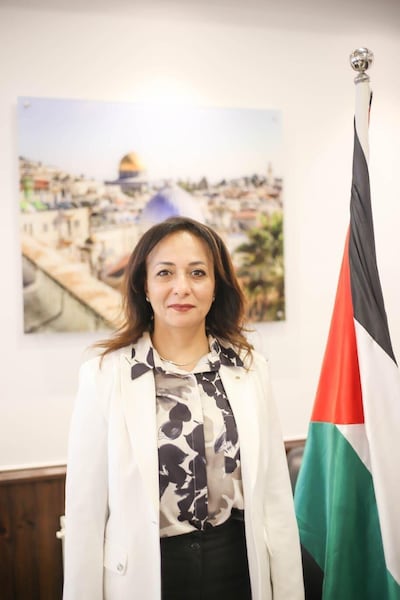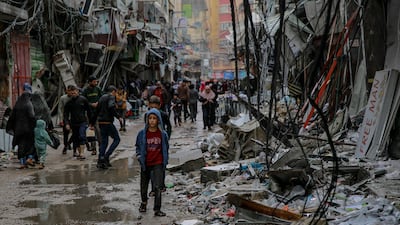Live updates: Follow the latest on Israel-Gaza
A senior Palestinian official has warned that hygiene will dramatically worsen in Gaza this winter, putting the enclave, where there is already an increased threat of serious disease, on the brink of yet another humanitarian catastrophe.
Heavy rains will mix with sewage and waste water creating a “huge issue”, especially for Gaza’s most vulnerable groups, said Samah Hamad, the Palestinian Minister of Social Development.
Her warnings come as Israeli forces once again close in on northern Gaza, forcing roughly 400,000 residents to head to overcrowded central and southern areas, where there is a critical shortage of shelter.

Speaking to The National one year after the Gaza War began, Ms Hamad also set out Palestinian plans to deal with the massive number of children orphaned by the war.
“The natural environment in Gaza, particularly given the amount of ground that is sand, creates a greater risk of contaminated water. Women, children, the elderly and handicapped will be most at risk when winter comes, the groups that we focus on as a ministry,” she added.
“The stories we hear direct from the ground, especially about the suffering of women – you would be shocked. Their health in particular. Some are cutting their hair off because there’s no way to clean it and stay hygienic anymore.”
The minister’s warnings come as Unicef said it had agreed “area-specific humanitarian pauses” with Israel’s military to allow for a second round of polio vaccinations for almost 600,000 children under the age of 10. “It is critical that these pauses are respected by all parties. Without them, it is impossible to vaccinate the children,” said Catherine Russell, the organisation’s executive director.
Polio, now a major risk for Gazans, is not the only disease that threatens to spread because of poor hygiene conditions. Organisations that operate in the strip have long warned of a rise in dysentery and severe skin conditions, among others illnesses.
On how the Palestinian government plans to deal with a surge in the number of orphans, Ms Hamad said the “most important thing is to identify their location” and match them to financial support.
Ms Hamad said her ministry estimates there are about 22,000 new orphans in Gaza because of the war, on top of a similar number before it began.
“We are assembling a full database from hospitals and other colleagues. From this we are creating an online portal specifically for orphans. The main objective we want to reach is to list all potential financial sponsorship for these orphans on to one platform to identify financial gaps,” Ms Hamad said.
“[Money] will come from all sorts of organisations and individuals. When you talk about orphans, people are usually willing to donate. This is especially the case in Arab and Muslim countries, where it is viewed as something of a religious duty.”


